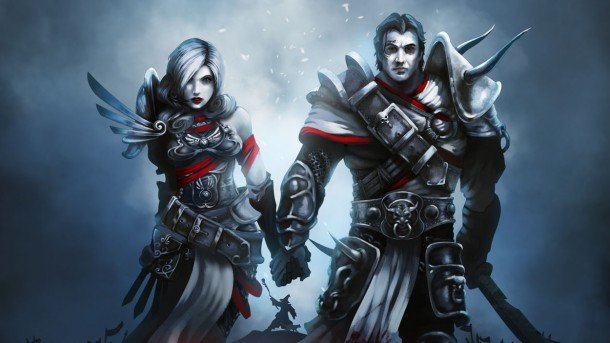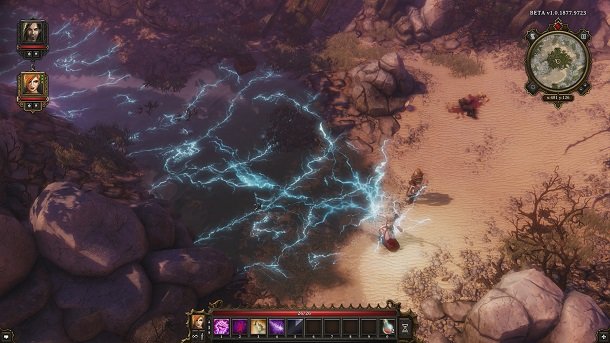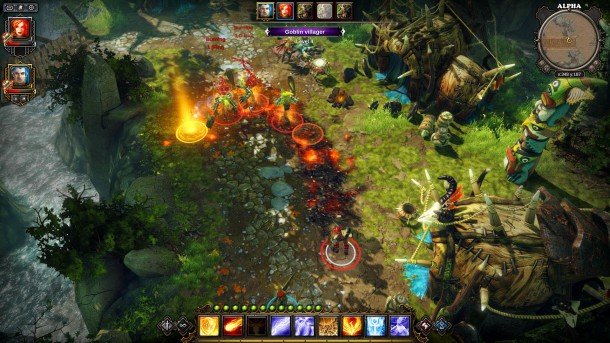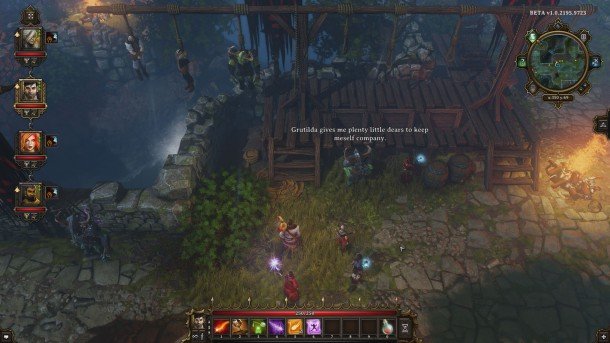Divinity: Original Sin interview: how Larian built an RPG with no wrong choices, and details on its next update

Larian Studios launched the final version of Divinity: Original Sin on June 30, after a successful Kickstarter campaign and a long stint in Steam Early Access. The extended beta time paid off: Original Sin has been the top selling game on Steam since its launch. Speaking to PC Gamer on Tuesday, Larian founder and creative director Swen Vincke says the team is "very happy," and though I can tell he's tired, he's still incredibly excited to talk in detail about my progress through the game.
One would expect it's vacation time for the studio, but not yet—Vincke tells me that Larian has a major content update coming for the game, hopefully in the next week, and exclusively revealed plans for new companion AI. Our edited discussion is below, including a few clearly-marked spoilers on early parts of the game.
PC Gamer : How do you guys feel post launch? You said you're still working on the game, but what's the vibe at Larian right now?
Swen Vincke : It's funny because everybody's still so focused on doing the patching that we haven't had time to celebrate yet. Everybody took some breaks to get some sleep, and most of us took a long weekend, but now we're focusing on the patch, and we're going to have our first [release] party next week. It will be a big one, and then we're going to go on a big holiday and then there's going to be a huge party. Right now, actually, everybody's like, "Okay, we released, so we continue to work on it." It's a rather funny feeling to be honest. We're very happy obviously.
PCG : It's the only project that Larian has right now, right? You're not working on anything else.
Vincke : No. This was all-in for us, so we said, "We have one shot at making a good RPG. This is going to be the one, so we'd better not fuck it up." That was basically the attitude, so it was stressing. But we're happy now of course.
PCG : What kind of things are you looking at in the big update?
The biggest gaming news, reviews and hardware deals
Keep up to date with the most important stories and the best deals, as picked by the PC Gamer team.
Vincke : We basically have two types of things. We're doing hotfixes where we see problems that we can fix right away for people, and then the patch will contain some extra content. Balancing fixes. We'll introduce the AI personalities—that was one feature that didn't make it fully for release. [Right now] you only have no personality or random personality, which is rather clunky to play with, or the loyal personality which basically does everything you do. We will add five or six AI personalities, and they have distinct opinions about things, and so it's basically your partner. [And] people will be able to create their own personalities.
They make decisions based on certain type of personality, and it makes the game quite different, actually, because then it's really like playing with a human being, to a certain extent.

PCG : Can you go into a little more detail on the kind of personalities that you're shipping in the update?
Vincke : We'll have a knight. That's what you can imagine. Then we'll have a rascal, a maniac, a judge— somebody who's very judgmental—a priest, and a free-spirit, They basically all have different traits that they prefer.
If you put in, let's say, a judgmental character, who would for instance refuse to hire a companion, that's a very big impact on your game right there. If you role-play through that, that really changes your game. It's something that can happen in multiplayer also, right? It's basically what we're trying to do. This gives single-players the feeling of what you get in co-op multiplayer, when you deal with the actions of somebody else.
PCG : Did you guys have a sense of the right way for someone to try to play this game? Is it really designed for multiplayer or is it designed to be single-player and the multiplayer is just a bonus for people who want to make that commitment?
Vincke : It's been designed from the bottom-up with the multiplayer in mind, under the motto that the multiplayer will make the single-player stronger. That sounds strange, so allow me to explain that.
If you make enough RPG like this, in which the party can split up at any time, and each player can do whatever he wants, there is an enormous amount of contingencies that you have to put in place, or you have to come up with a very systemic system which is pretty much what we've done. You have to make sure that whatever storytelling you're trying to do it will work no matter what the players are going to do.

[Spoilers follow]
Say that you have PetPal, for instance, which lets you talk to animals. And you're trying to find a murderer, so you talk to Murphy, a dog.
PCG : I didn't have PetPal yet, actually.
Vincke : All right. That was an option. You could have talked to him. He would have tell me, "Bring smelly clothes to me," and then you could have pickpocketed clothes from somebody, or you could have stole it from their or whatever. He would have smelt the person who was last in contact with Jake. You have that as an option. That's one of the things that was built in.
Say that you [playing co-op] and I am your other player and I've killed Murphy—just because the dog is annoying me. The game has to be able to handle that and allow you to continue [the quest]. The fact that we had to do that actually makes the single-player much stronger, because all that freedom that you get in single-player for a large part is inspired by the multiplayer part, because we had to cater for it.
[Spoilers end]
When you're playing it in multiplayer you can be rest assured that becomes very unpredictable, what people are doing. A lot of the development effort was actually focused around that. I'm really happy that we've done it, because typically people always say it dumbs a game down, the fact that you have the multiplayer, and I think in our case it actually strengthens it.
We didn't talk about quests at some point anymore. We just talked about situations which occurred, that players could encounter, and there was no right or not wrong way of doing it. It was just something that happens on your journey. So my advice to anybody doing an RPG would be, "Make a multiplayer version out of it."

PCG : In Cyseal, all the quests that you're given eventually end up feeling like they're part of one big cohesive plot. Is that another thing that you set out from the beginning to do, instead of giving you forking paths, bringing everything together, even though they feel so separate at the beginning?
Vincke : Yeah. We did it because, again, we had one guarantee, that we always thought, our backers and our community, this is a game which you should be able to play until the very end even if your're killing everybody. Generally it fits that pen-and-paper, systemic approach that we wanted to have, but one of the problems you have then is that we don't know who you're going to kill up-front. We have to make sure that no matter what angle you're going to take at the storyline, at least you'll have an impression that the story has been processed for you, that you're progressing in a certain way.
One of the questions designers have always had to answer here in the office was, "Okay, what happens if you kill [a character]? How will players know how the plot progresses?" I'm not going to say that it's always easy, but there's always what we call the n+1 solution. There's n solutions, and then there's always a fall-back solution. The one that is always going to work, no matter what. A player can stumble upon an answer and make some progress. Obviously, if you kill everybody life becomes hard, but even then you will still find out what to do, and you will be able, from diaries and notes and signs, you will be able to figure out, "Hey, maybe I should go in that direction," and if we did our job correctly that should always work.

